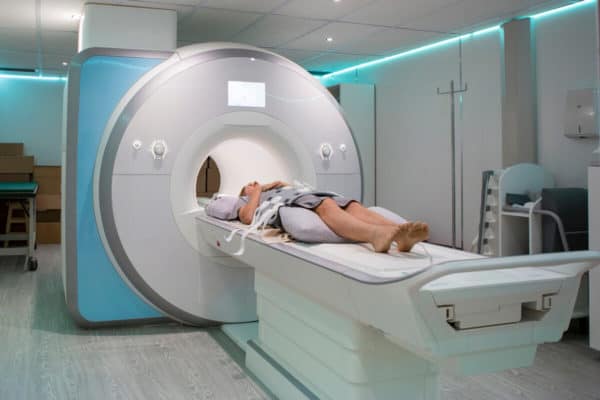If your doctor recommends an MRI scan to examine or diagnose a medical issue, you’re going to want to know whether the cost of the scan will be covered by Medicare. MRI scans can cost an average of $2,611 in the U.S., so you don’t want to be stuck paying out of pocket.
Fortunately, Medicare has been covering MRI scans, when medically necessary and requested by a doctor, since 1985 – a year after they were first approved for use by the FDA.
Let’s look at some of the reasons you might be advised to get an MRI, and which situations are covered by your Medicare plan.
WHAT IS AN MRI?
MRI stands for Magnetic Resonance Imaging and is a non-invasive procedure that uses radio waves and magnets to create digital images of your body. Although they are similar to images from X-rays and CAT scans, an MRI machine doesn’t expose the body to radiation and can take more detailed images of internal organs and the brain.
Neither procedure is painful, but the MRI scan takes place in a narrow tube and takes longer, so it can be uncomfortable for claustrophobic patients. MRIs are also not recommended for people with pacemakers or aneurysm clips since it can cause them to malfunction. Talk to your doctor if you have any metal implants, including dental implants, IUDs, or even recent tattoos.
MRI scans can last anywhere from 15 minutes to over an hour, and they require the patient to be completely still since any movement can lead to a blurry image. The machine will make a series of loud, mechanical sounds, so you may be offered earplugs or headphones.
MRIs are more expensive than CAT scans, but because they don’t emit radiation, they are safe to undergo multiple times. The main long-term risk is from contrast dyes that are used in some scans. The dye contains gadolinium, a heavy metal that is excreted by the kidneys and can cause complications in patients with renal problems.
For most patients, you’ll experience no side effects and can go home immediately after your scan. Claustrophobic patients may have the option of taking a sedative before the exam. For obese or claustrophobic patients, an “open” MRI machine is available in some facilities.
WHAT AN MRI SCREENS FOR
An MRI is used as a diagnostic tool. It can’t be used to treat conditions, but it can help doctors locate tumors, aneurysms, and other internal medical issues. MRIs are not recommended for routine preventive testing if no symptoms are present, but your doctor may suggest an MRI if anomalies are found in other routine medical procedures.
An MRI can provide useful results on its own, or it may be a preliminary step before undergoing a more specific procedure. Although the image itself can be produced quickly, a radiologist will need to review it before your doctor can provide you with the results of your scan.
Here are just a few of the common conditions that MRIs can screen for:
Cancer
One of the most important uses of MRIs is to locate tumors and to find out if cancer has spread. Your doctor may use contrast dye administered intravenously to help the tumor show up in the images. They can then come up with a treatment plan based on the location of the cancer.
MRIs are used to detect brain and spinal cord cancers, breast cancer, rectal and prostate cancers, and more. They can also be used to check on the size of a tumor and see if a treatment is working, and to determine which stage of cancer a tumor has progressed to.
They’re not typically used for lung cancers since the movement of the lungs during respiration interferes with the accuracy of the image, and a CAT scan may be used instead.
Alzheimer’s Disease and Dementia
MRIs are often used to diagnose Alzheimer’s disease and other neurological conditions. When a patient exhibits symptoms of Alzheimer’s or dementia, an MRI can rule out other causes, such as a stroke or hemorrhage.
An MRI can show a loss of brain mass and a reduction in the size of the hippocampus, which is linked to Alzheimer’s. MRIs are one of the most accurate ways to predict dementia, leading to earlier treatment and better health outcomes.
MRIs are also used to diagnose other neurological issues such as epilepsy. For some tests, an fMRI (or functional Magnetic Resonance Imaging) scan may be used instead. This type of MRI can detect changes in blood flow and brain activity.
Cardiovascular Disease
Cardiovascular MRI scans are used to detect heart disease and other anomalies of the cardiac system. Magnetic resonance angiography is used to create images of the blood vessel, which can detect aneurysms, stenosis (narrowing of the arteries), atherosclerosis (clogging of the arteries), and other circulatory conditions.
Your doctor may recommend a cardiac MRI if you’re at risk for heart disease or one of these other conditions, or to evaluate the damage caused by a heart attack.
Liver, Gastrointestinal, and Musculoskeletal Conditions
Hepatobiliary MRIs, which create images of the liver and pancreas, can be used to find cancer or lesions caused by cirrhosis. MRIs can also be used to examine the gastrointestinal tract for issues related to IBD (inflammatory bowel disease) and stomach or colorectal cancer.
MRIs may be used to investigate abdominal pain, but are not typically recommended for lower back pain. Although they can detect herniated disks, they often lead to overtreatment and are not considered effective at improving health outcomes for patients with back pain.
Abdominal MRIs may require the use of contrast agents, and patients are advised to fast for up to 6 hours before the exam.
DOES MEDICARE PAY YOUR MRI?
MRIs are incredibly versatile exams that can be used to diagnose a variety of conditions. But they’re also more expensive than similar tests, such as X-rays and CAT scans. If your doctor recommends an MRI, how can you find out whether it will be covered by Medicare?
Fortunately, Medicare Part B covers diagnostic tests that are considered “medically necessary” and ordered by your doctor. If you just want to have an MRI as a preventive measure when no symptoms are present, then you won’t be covered. But for most cases – to diagnose cancer, heart disease, dementia, or any of the other conditions listed above – then you will be.
HOW TO FIND OUT IF YOUR MEDICARE PLAN PAYS FOR YOUR MRI
First, speak with your doctor to find out what the MRI will be used to examine. Are you having symptoms of Alzheimer’s or dementia? Are you following up on an anomaly that showed up on another exam? Are you diagnosing or developing a treatment plan for cancer? In all of these situations, an MRI scan is likely to be considered medically necessary.
Second, make sure that your doctor, and the lab or facility where you have the scan, accept Medicare assignment. This will help keep your costs as low as possible. If they don’t accept assignment, they can charge as much as 15 percent in additional costs, which the Original Medicare plan won’t cover. You’ll have to pay these excess charges out of pocket.
Third, look at what kind of Medicare plan you have. If you’re on Original Medicare, diagnostic tests are covered under Part B. If you have a Medicare Advantage plan, then your plan must cover you at least as well as Original Medicare, and may even offer additional coverage. For example, your policy may cover any excess costs your doctor charges.
If you receive an MRI while you’re an inpatient at a hospital, then Part A coverage will apply instead, which has a different copay and coinsurance charges than Part B.
HOW MUCH YOU MIGHT STILL HAVE TO PAY
If your doctor recommends an MRI and your plan covers it, how much will you have to pay out of pocket? That depends on whether you’ve met your yearly deductible. If you’re covered under Original Medicare Part B, then the annual deductible is $185. After that, Medicare will cover 80 percent of the costs and you’ll be responsible for 20% coinsurance.
So under Medicare Part B, an MRI that costs $2,611 without insurance would cost around $522. That’s still a lot of money, but at least you won’t be paying the full cost out of pocket. Remember, you can look into getting a Medicare Advantage plan that offers better coverage than Original Medicare and may have a lower deductible or coinsurance for diagnostic tests.
SUMMARY
Finding out whether you’re covered for a medical procedure can be stressful, especially when your doctor recommends a test that you’ve never had before. But while MRIs can be expensive, your Medicare plan should cover most of the costs. If you need help figuring out your coverage, or want to switch to a Medicare Advantage plan, you can reach out to the team at the Medicare Store. Our licensed insurance agents know all about your coverage options and can help you understand what plan is best for you. Just fill out our contact form and one of our team members will give you a call!



